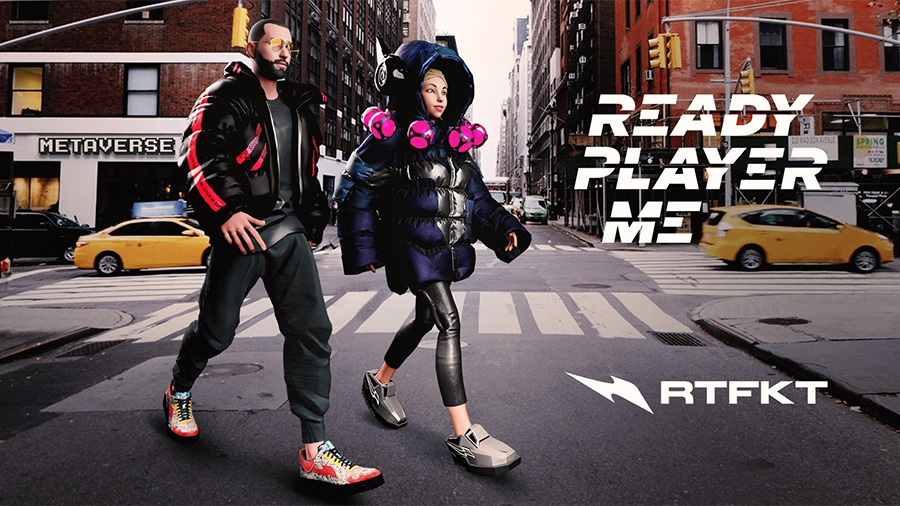Nike Inc.’s acquisition of RTFKT, a virtual sneaker design company and a studio for non-fungible tokens (NFTs), is another sign that the sportswear giant is a big believer in crypto-technology and sees significant revenue opportunities in the metaverse and digital footwear.
The deal was announced Monday, and the terms of the transaction were not disclosed.
In May, the London-based startup raised an $8 million seed round led by Andreessen Horowitz at a valuation of $33.3 million.
Last month, Nike became one of the first big brands to enter the metaverse, a world where virtual reality (VR) and augmented reality (AR) technologies transform people into avatars to play, socialize, shop, and work alongside others virtually. In such blockchain-based environments, users can buy virtual land and other digital assets such as apparel for avatars in the form of crypto assets called non-fungible tokens (NFTs).
The shared virtual world environments recently gained prominence after Facebook rebranded itself to Meta Platforms.
In announcing the acquisition, Nike described RTFKT (pronounced “artifact”) as “a leading brand that leverages cutting edge innovation to deliver next-generation collectibles that merge culture and gaming.”
Formed in 2020 by Benoit Pagotto, Chris Le and Steven Vasilev, RTFKT creates digital products like sneakers and uses blockchain technology to ensure authenticity. Launched in January 2020 and only moving to monetize the business in October 2020, RTFKT has raked in millions of dollars by selling virtual sneakers.
Some of its more significant NFTs releases include the February 2021 launch of a series of rainbow-colored virtual sneakers with crypto-artist Fewocious. The studio sold 621 pairs through cryptocurrency purchases in seven minutes, bringing in a total of $3.1 million. The digital sneakers then doubled in price in the secondary market a few weeks later.
In late November, RTFKT dropped an avatar partnership with Japanese artist Takashi Murakami called CloneX. The CloneX project gained almost $69 million in transaction volume at an average sale price of approximately $15,200 in over 4,500 transactions.
In addition to building out its NFT drops, RTFKT had collaborated with other crypto creators to design items, including physical shoes that use imagery in other NFT projects, including CryptoPunks and Bored Apes. According to OpenSea, RTFKT has 561 NFTs in its collection and has created 1000 others.
RTFKT has also held “forging” events where NFT holders have the opportunity to receive a hypercrafted physical reciprocal product of their digital sneaker.
“This acquisition is another step that accelerates Nike’s digital transformation,” Nike’s CEO John Donahoe said in the statement. “We plan to invest in the RTFKT brand, serve and grow their innovative and creative community and extend Nike’s digital footprint and capabilities.”
RTFKT wrote on its Twitter account, “We will continue to evolve our brand, innovations, products, and community with NIKE resources and talents. NIKE is the only brand in the world we always looked up to and got inspired by when starting RTFKT.”
Nike first began thinking about NFTs in 2019 when it secured a patent for blockchain-compatible sneakers known as “CryptoKicks.” Under the patent, once purchased by a registered seller, the buyer receives a corresponding NFT that uses blockchain technology to verify authenticity and ownership. If the shoes are subsequently sold or traded, the digital token follows.
In recent months, the brand has accelerated efforts in the virtual space. In October, Nike filed seven requests with the U.S. Patent and Trademark Office in late October to protect its marks in “downloadable virtual goods” and related services. Reports arrived in November that Nike was posting jobs inquiries in the NFTs space, including Virtual Material Designer I, Footwear.
In mid-November, Nike created a virtual world on the Roblox online gaming platform, NIKELAND, that enables fans of the brand “to connect, create, share experiences, and compete.”
Players dress up their avatars in Nike-branded footwear, apparel and backpacks while competing in mini-games, such as “Tag,” “Dodgeball” and “The Floor Is Lava.” The game includes a digital showroom that allows players to outfit their avatar with unique Nike products. At Nike’s House of Innovation (HOI) store in New York City, a Snapchat lens transforms the kids’ floor into an AR-version of NIKELAND.
Virtual worlds such as Roblox are increasingly attracting attention and investment from fashion and apparel brands since the platforms allow companies to connect with younger users and create awareness for their products.
On December 2, Adidas announced that it had purchased a Bored Ape Yacht Club NFT and is collaborating with Bored Ape creators Yuga Labs and others in the space to enter the metaverse.
Piper Sandler analyst Erinn Murphy believes that the RTFKT acquisition will enable Nike to monetize its digital push further.
Murphy said in a note, “We see a material revenue (and margin) opportunity exist if Nike is able to somehow connect the digital and physical realms and successfully tie their most collectible and rare sneakers to NFTs, which allow for royalty structures to provide recurring revenue in the aftermarket–especially with the growth of sneakers as social currency as spotlighted by the immense and accelerating popularity of rare Jordan silhouettes on secondary market platforms.”
Jim Duffy, an analyst at Stifel, said Nike’s acquisition and investment into the RTFKT brand would provide Nike with the opportunity to reach RTFKT’s quickly-built fan base. He also anticipates the partnership could accelerate the long-anticipated launch of CryptoKicks and tap the potential of virtual sneakers and apparel.
“With increasing momentum into NFTs from major brands (Adidas announced partnerships with the Bored Ape Yacht Club and Coinbase in November 2021), the acquisition of RTFKT will give Nike a boost in the race to gain traction with NFT collectors and digital fashion enthusiasts,” wrote Duffy in a note. “We appreciate the strategic value of the acquisition to provide the platform, established brand, existing community of RTFKT NFT owners, and talent to expedite the expansion into Nike’s potential NFT offerings and capitalize on the opportunity.”
In a note issued December 4 exploring themes in the fashion space for 2022, Camilo Lyon, an analyst at BTIG, predicted the strength seen in 2021 in NFTs in the retail space would continue in 2022. He believes luxury brands see NFTs helping reduce counterfeits by creating a verifiable way of authenticating original purchases.
“When a consumer purchases a Chanel handbag, for instance, there is a paper certificate of authentication included inside the bag,” explained Lyon. “With an NFT, the digital token of authentication can never be lost because ownership information lives on the blockchain forever and, more importantly, can be traced back to its original manufacturer. Ostensibly, this would create greater comfort among consumers looking to buy luxury goods on the secondary market.”
He also predicted that more brands would explore the NFT opportunity in 2022 in the metaverse. He noted that in the active lifestyle space, Vans, owned by VF Corp., has also partnered with Roblox. In September, Roblox announced a partnership with Vans to create a virtual skate park and offer users the chance to buy Vans gear.
“Ownership in fashion apparel or sneakers, like in the art world, would create the ability to port that purchased good from platform to platform or on social media with the intent of personalizing your style in the metaverse,” wrote Lyon. “What’s more, we believe brands are on the path to marrying the digital sale with a physical sale of the same goods, which would have the benefit of cementing an experiential connection between brand and consumer in a new and unique way with ownership qualities. While this strategy is in its infancy, we believe we will be hearing more about it from brands over the coming year.”
Nike is expected to further elaborate on the opportunity it sees in the metaverse and the RTFKT acquisition on its second-quarter conference call, scheduled to take place on December 20.
Photo courtesy RTFKT
















